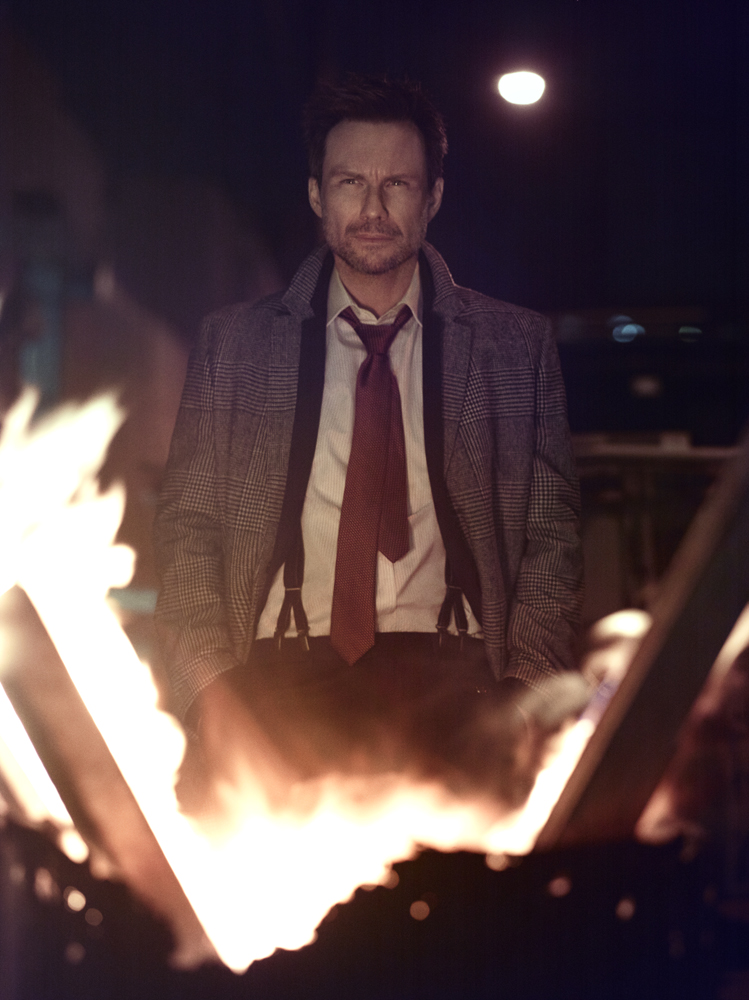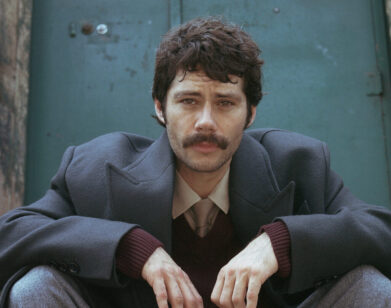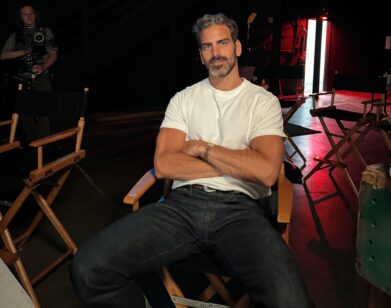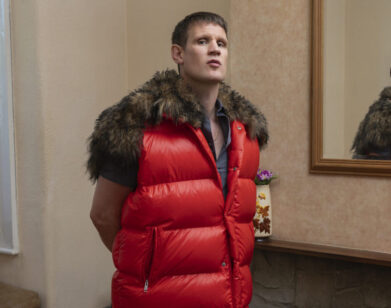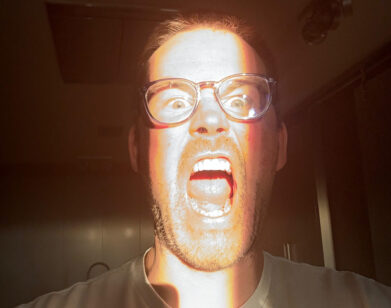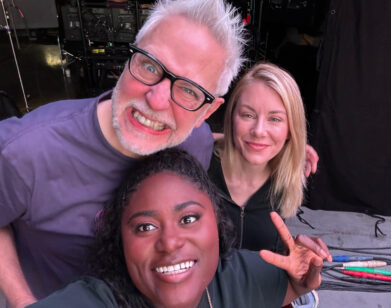Christian Slater
I grew up in this business; it’s a difficult foundation to start off from. Success can be a very difficult thing to deal with. Christian Slater
For an entire generation of filmgoers, Christian Slater is the enfant terrible, the rebel antihero, the last of the analog bad boys—an image and a designation of which he’s long been fighting to free himself.
After a series of childhood roles on TV and in the theater, and across from Sean Connery in the 1986 adaptation of Umberto Eco’s medieval mystery The Name of the Rose, Slater exploded with a series of beloved cult movies—Heathers (1989), Gleaming the Cube (1989), Pump Up the Volume (1990), and True Romance (1993). Looking and sounding a lot like the reigning bad boy of film, Jack Nicholson, Slater became the dark-edged leading man with rasp and charm.
The inevitable blockbusters followed—including Interview With the Vampire (1994) and a face-off with John Travolta in Broken Arrow (1996)—as did the inevitable curveballs and misfires. But what was true of Slater from the start—his rough and readiness, his willingness to mix it up, to laugh, even at himself—has continued to make him a fascinating performer. With recent madcap appearances in lighter fare (on FX’s animated adventure series Archer and in Hot Tub Time Machine 2), a searing performance as Joe’s father in Lars von Trier’s Nymphomaniac, and a new role as the eponymous leader of an underground hacker group in the upcoming USA show Mr. Robot, Slater, now 45, looks to be finally accepting the range of his gifts and the weighty expectations still trailing him from his early success. As he begins this new chapter, Slater seems to be setting everything in its proper place and taking his rightful spot, not as the Nicholson of his generation, but as the witty and beguiling performer he’s always been.
As he tells his pal von Trier, it feels a lot like coming home.
LARS VON TRIER: What the fuck are you doing?
CHRISTIAN SLATER: [laughs] Living in New York. My wife and I have been in Hell’s Kitchen for the last year, which is great. I was born and raised here.
VON TRIER: But you lived in Florida?
SLATER: Yeah. When we met, we were in Florida. But then she got a job at Phillips auction house. And I got a job on a TV show here called Mr. Robot. I take the subway to work.
VON TRIER: Fantastic. And is it fun?
SLATER: It is. I mean, the show is interesting. And it’s directed by Niels Arden Oplev, who did The Girl With the Dragon Tattoo [2010]—the original version. The beautiful thing for me is that I play the mentor character. So I come in for a day or two, tell all the young people what to do, and then I leave.
VON TRIER: I want to know all about you, the history of your golden life.
SLATER: Yes, my golden life. But, first of all, how is Bente?
VON TRIER: She’s good. She’s not at home right now, so I can drink a little wine when she’s not here. [Slater laughs] That’s how it goes here—no control whatsoever.
SLATER: That’s right. It’s a free-for-all.
VON TRIER: So, is it a golden life right now?
SLATER: It is probably more golden than I will ever acknowledge, you know? I have that glass-half-empty syndrome, and it takes a great deal of effort to climb out of the hole of darkness that I choose to live in mentally.
VON TRIER: That’s because you’re worth something. You have to be melancholic and a little sensitive.
SLATER: Very sensitive. But when I look around … I’m certainly happily married, I have a great relationship with my kids. My 16-year-old son is moving in with us shortly. I’m excited to get the opportunity to be a bit more of a father in his life.
VON TRIER: A lot more of a father. You were about that age, 15 years old, when you started.
SLATER: I was. Well, let’s see, I was born and raised here in New York. I grew up on the Upper West Side. My father was an actor and my mother was his agent, so I had it on both sides, the crazy actor and his representation. The first job I had was a Pampers commercial. And I used to go with my father whenever he would do a performance. I remember clinging to his legs saying, “Please. Take me with you.” And he would. I would sit in his dressing room or hang out in the wings on the side of the stage and just watch him do his performances.
VON TRIER: Come on. That’s really sick. How could he treat you that way?
SLATER: How could he take me to the theater?
VON TRIER: Yeah. To take you to the most dangerous place in the world.
SLATER: [laughs] Theater was definitely part of my roots. My father would take me to plays, and then my mother was always on the lookout for other talent and taking me to see plays. I saw Frank Langella in Dracula … Great, great performances. I was a theater rat, hanging out backstage. I remember seeing Yul Brynner in The King and I, watching him do his death scene night after night after night. There were a lot of experiences like that. And then I started to get jobs. My mother became a casting director and she cast me in a soap opera called One Life to Live. I was, like, 8 years old, playing a kid who had hurt himself on a skateboard. I had, like, three lines. I did the lines and everybody in the studio applauded—I was immediately hooked after that. I was like, “This is the life for me.”
VON TRIER: I was in a Danish show when I was 12. It was fun because I was doing a lot of 8mm films. So we were kind of doing the same thing. There is something about that, that sweet spot.
SLATER: We are kindred spirits. I was 9 years old, so I didn’t know what the hell I was doing. But my mother brought in somebody to help me, and I started to just get a sense of what it was to be a performer, and I just started to really love it and embrace it and cherish it. I loved going to the theater every night and being a part of it. That was a nine-month tour [for a traveling production of The Music Man], so I had to leave home and travel around the United States. I basically had guardians for that entire length of time. So it was challenging, but the hardest part was when it came to an end, you know? You develop a family with everybody who’s been through this experience, and when it’s done, it’s over. I was 9, 10, and I didn’t really understand that these things come to an end. It was heartbreaking.
VON TRIER: Do you understand that now?
SLATER: I think I get it now. I mean, my life is certainly a lot more streamlined. I have a few friends, but it’s a small group. I basically rely on my wife’s family.
VON TRIER: But you must have friends and family in New York.
SLATER: You would think, but when I was about 16, we moved to Los Angeles and I was out there for 20, 25 years. I lost contact with a lot of people. I actually was on Facebook the other day to see if I could find a few of the people who I went to high school with.
VON TRIER: So, at 16 you moved to L.A.?
SLATER: I was about 16 when I got The Name of the Rose—
VON TRIER: Sean Connery is fantastic.
SLATER: Oh, yeah, let’s talk about Sean Connery. I was a 16-year-old kid coming to this six-month shoot in Germany and in Rome, and having this experience, having Sean Connery there was extraordinarily helpful. He’s just a king and was such a great example for me. But also a little intimidating—the guy’s James Bond for God’s sake. Being a sensitive, nervous, sometimes insecure actor, there were moments when I was shaking in my boots. But he made me feel a lot safer than I would have had he not been there. But that movie wasn’t so successful in America.
VON TRIER: Well, you made it in America, too.
SLATER: Somehow. I had a couple of nice opportunities with some wonderful movies. Heathers was probably the first time when I started to notice that people were opening doors for me and giving me tables at restaurants, regardless of what I was wearing. A whole world opened up to me that was shocking and weird and different, and I enjoyed it and, you know, I took great advantage of it at times. No doubt about it. But then I did this other movie that I really loved called Pump Up the Volume, which, I don’t know if you’ve ever seen that, but that’s one of my favorite movies from that time period.
VON TRIER: And what did your father say about all this?
SLATER: Wow. He was very happy that he had taught me to sing. My father was very excited to lay claim to his role in the success that I had been experiencing. [both laugh] No, he was great. What do I say about my father?
VON TRIER: Do you see him today?
SLATER: Well, no. I haven’t seen him in a few years. We just spoke recently. He’s a manic-depressive schizophrenic. He’s always had trouble—he was a fantastic actor and extraordinarily charismatic and very, very good looking, but he had a really difficult time working with directors, collaborating with people. And that made his life very challenging. He’s in a place now, getting a lot of help from someone. We hadn’t spoken in about nine years, because I was in the middle of the relationship between my mother and my father, and I needed to get out of that. So I just sort of removed myself entirely from that equation to build my own life and take responsibility for myself. But in the last few months my father actually reached out to me and wanted to reconcile and reconnect. I was very grateful to be able to communicate with him. From a tumultuous, back-and-forth relationship, we were able to begin to build a better bridge for the both of us. So that was good. And, similarly, with my mother … You know, I grew up in this business; it’s a difficult foundation to start off from. Success can be a very difficult thing to deal with.
VON TRIER: You have to go and see your father. Come on.
SLATER: Well, he’s in Los Angeles right now.
VON TRIER: You have to use a little time on that. I know from experience that, all of a sudden, they are dead, right? And you have no chance of talking or communicating.
SLATER: I am in agreement with you.
VON TRIER: It was so good to work with you.
SLATER: Oh, man. I loved it. Actors love to be challenged, love to be scared, love to do new things. And there were certainly a lot of things that I was scared to do in Nymphomaniac. The dialogue about the trees—I was really scared about that. You know, you’re never quite sure if you’re going to be up to the challenge, but you feel the fear and say, “Fuck it,” and do it anyway.
VON TRIER: I think it is interesting that we get along so well. Simply because we come from very, very different situations, right? But I just felt straight away, “Oh, here’s a guy I can trust.” I haven’t felt that with many male actors.
SLATER: Also you’re very funny. I mean, after I did my dramatic death, you said, “Eh, you’ll probably never work again.” [both laugh]
VON TRIER: But you did. As the robot king. I could’ve been meaner. I think I said, “The only thing you can do from now on is Mr. Robot …”
SLATER: That’s right, yeah. [laughs]
VON TRIER: You look like you’re in good sprits.
SLATER: Well, yeah. First of all, because I haven’t seen you in so long. It’s lovely to have an opportunity to reconnect. And I do find you to be hilarious. And it kind of feels like life is going in a very nice … Dare I say, “So far so good”? Living here again, it feels like home. When we were living in Miami, we were behind some gates, sitting there in the living room looking at each other like, “Well, I guess that’s it. We’re sort of done with life.” Coming back to New York reinvigorated the both of us. And we both love what we’re doing. Life—it’s so unpredictable. Just a ride on the Cyclone, you know?
LARS VON TRIER IS A PALME D’OR-WINNING DANISH FILMMAKER.

